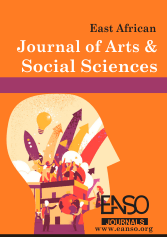Evaluating the Role and Effectiveness of International Mechanisms, Particularly the International Criminal Court (ICC), in Addressing M23’s Criminal Responsibility: A Case Study of Eastern Democratic Republic of Congo
Abstract
This article examines the resurgence of the Mouvement du 23 Mars (M23) in the eastern Democratic Republic of Congo (DRC) and evaluates the effectiveness of international and regional mechanisms, particularly the International Criminal Court (ICC), in addressing the group’s criminal responsibility. Although the DRC is a State Party to the Rome Statute and has enacted domestic legislation criminalising war crimes, crimes against humanity, and genocide, accountability for atrocities committed by M23 remains limited. Using a doctrinal and policy-oriented methodology, the study draws on treaty law, jurisprudence, UN investigations, and regional political practice to analyse the gap between legal obligations and practical enforcement. The article traces M23’s evolution from its emergence in 2012 through its renewed offensives from 2021, highlighting grave violations of international humanitarian and human rights law, including killings, sexual violence, torture, forced displacement, pillage, and the recruitment of child soldiers, all of which meet the thresholds of international crimes under the Rome Statute. Despite extensive documentation of these violations, prosecutions at domestic and international levels have been sporadic due to weak judicial capacity, corruption, political interference, insecurity, and the reluctance of some regional actors to cooperate with accountability processes. To interpret these enforcement challenges, the study applies theoretical perspectives including International Legal Accountability, Deterrence Theory, Transitional Justice, Command Responsibility, and Legal Pluralism, demonstrating how structural and political constraints undermine justice in non-international armed conflicts. The article argues that meaningful accountability requires coordinated action between the ICC, regional bodies, and domestic institutions, grounded in victim-centred reforms and stronger political guarantees. It concludes by proposing a practical roadmap that includes enhanced ICC regional cooperation, targeted sanctions, a Great Lakes hybrid tribunal, and institutional reforms aimed at closing the persistent gap between legal frameworks and accountability in practice.
Downloads
References
Akhavan P. International Criminal Law and the Challenge of State Sovereignty (Oxford University Press, 2018).
Anderson KWK. The International Criminal Court and its Challenges: Towards a New Legal Order (Cambridge University Press, 2012).
Bassiouni MC. Introduction to International Criminal Law (3rd edn, Springer 2013).
Happold M. The Age of Criminal Responsibility in International Criminal Accountability’ in
Karin Arts and Vesselin Popovski (eds), International Criminal Accountability and the Rights of Children (T.M.C. Asser Press 2006).
Luban D. The Morality of International Criminal Law (Oxford University Press 2004).
Matsunaga K. The International Criminal Court: A Primer (Cambridge University Press, 2013).
Mégret F. International Criminal Law and the Politics of Legality (Cambridge University Press 2018).
Merrills JG, International Dispute Settlement (Cambridge University Press, 2013).
Moses LN. International Criminal Law and International Humanitarian Law: Exploring the Interface (Oxford University Press, 2015).
Nollkaemper A. The Interaction of National and International Law in Human Rights Cases (Routledge 2010).
Prunier G. Africa’s World War: Congo, the Rwandan Genocide, and the Making of a Continental Catastrophe (Oxford University Press, 2009).
Mureithi B. Armed Groups and Human Rights in Africa, Cambridge, Cambridge University Press, 2012
Stearns J K. Dancing in the Glory of Monsters: The Collapse of the Congo and the Great War of Africa, Public Affairs, 2011
Autesserre S. The Trouble with the Congo: Local Violence and the Failure of International Peacebuilding (Cambridge University Press, 2010).
Engle Merry S. Legal Pluralism and Human Rights (Oxford University Press, 2006).
Mettraux G. Command Responsibility in International Criminal Law (Oxford University Press, 2009).
Teitel RG. Transitional Justice (Oxford University Press, 2000).
Journal Articles
Musila MG, ‘‘Challenges in Establishing Accountability of Child Soldiers for Human Rights Violations: Restorative Justice as an Option’’ (2005) 5(2) African Human Rights Law Journal.
Howard Z and Henry M, ‘‘Fundamental Concepts in Restorative Justice’’ (1998) Contemporary Justice Review 1.
Powers CJ, ‘‘Accountability or Rehabilitation? The Treatment of Child Soldiers in Post-Conflict Societies’’ (2012) 6(3) International Journal of Transitional Justice 318.
Clark P and Peskin V, ‘‘International Criminal Justice in Africa: Between Aspiration and Reality’’ (2017) 111 American Journal of International Law 628.
Jo H and Simmons BA, ‘‘Can the International Criminal Court Deter Atrocity?’’ (2016) 70 International Organization 443.
Official Reports and Documents
African Union Peace and Security Council, Communiqué on the Security Situation in Eastern DRC (2023).
ICC Office of the Prosecutor, Statement on the Situation in the Democratic Republic of Congo (2023).
ICC, Annual Report of the International Criminal Court (2023).
UN Group of Experts on the Democratic Republic of Congo, Reports to the United Nations Security Council (2022–2024).
UN Security Council, Resolution 1533 (2004).
UN Security Council, Resolution 2641 (2022).
Amnesty International, ‘Judicial Dysfunction in the Democratic Republic of Congo’ (Amnesty International, 2021).
Human Rights Watch, ‘DR Congo: M23 Rebels Commit Atrocities’ (Human Rights Watch, 2023).
International Crisis Group, ‘Easing the Tensions in Eastern DRC’ (International Crisis Group, 2022).
International Criminal Court, ‘Cooperation and Complementarity Challenges’ (ICC Policy, Report 2020).
United Nations Human Rights Council, ‘Report of the United Nations Joint Human Rights Office on the Violations Committed in North Kivu’ (UNHRC 2023).
United Nations Security Council, ‘Report of the Group of Experts on the Democratic Republic of Congo’ (2022) UN Doc S/2022/479.
UN Security Council Sanctions Committee, Report on M23 Sanctions Regime (2022).
Case Law
Prosecutor v Thomas Lubanga Dyilo (Judgment) ICC-01/04-01/06 (2012).
Prosecutor v Germain Katanga (Judgment) ICC-01/04-01/07 (2014).
Prosecutor v Bosco Ntaganda (Judgment) ICC-01/04-02/06 (2019).
Prosecutor v Jean-Pierre Bemba Gombo (Judgment) ICC-01/05-01/08 (2016).
Prosecutor v Dominic Ongwen ICC-02/04-01/15.
Prosecutor v Ahmad Al Faqi Al Mahdi ICC-01/12-01/15.
Legal Instruments
Geneva Conventions of 1949 and Additional Protocols.
Rome Statute of the International Criminal Court 1998.
UN Charter 1945.
Copyright (c) 2025 Sajidu Idrisa

This work is licensed under a Creative Commons Attribution 4.0 International License.




























